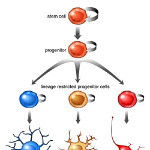Kategori Science
Created by: Barbara 60
Number of Blossarys: 1
Stem cells can divide asymmetrically to self-renew whilst also producing differentiating daughter cells. In the early mammalian cerebral cortex, neuroepithelial cells divide symmetrically to rapidly ...
Stem cells can divide symmetrically to generate daughter cells with similar fates. In the early mammalian cerebral cortex, neuroepithelial cells divide symmetrically to rapidly expand a stem cell ...
An increase in cell cycle length, specifically G1 phase, is naturally associated with the progression of neurogenesis. A recent model, referred to as 'cell cycle length hypothesis', has been ...
Besides radial glial cells, another type of neuronal progenitor cell—the basal or intermediate progenitor cells—emerges at the onset of peak neurogenesis. They accumulate in the subventricular zone, ...
A neuron is an electrically excitable cell that processes and transmits information through electrical and chemical signals. A chemical signal occurs via a synapse, a specialized connection with ...
Radial glial cells are a widespread non-neuronal cell type in the developing CNS of all vertebrates examined so far. They were first identified as a transient population that serves as a scaffold for ...
Neuroepithelial cells are the "stem cells" of the nervous system, deriving from actual stem cells in several different stages of neural development. These neural stem cells then differentiate further ...


 English (EN)
English (EN)





